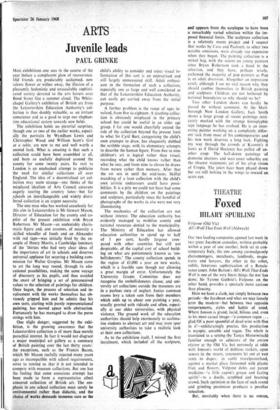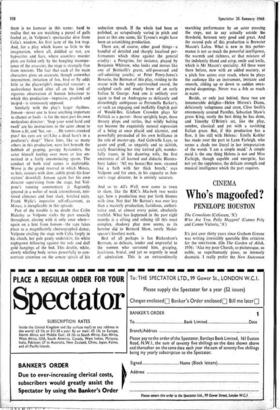THEATRE
Foxed
HILARY SPURLING
Volpone (Old Vic) All's Well That Ends Well (Aldwych)
Our two leading companies opened last week in two great Jacobean comedies, written probably within a year of one another, both set in con- temporary Italy, the one among curmudgeonly cheesemongers, merchants, landlords, magis- trates and lawyers, the other in the sober, subtle, luxurious sophistication of a Renais- sance court. John Barton's Airs Well That Ends Well is one of the very finest things the RSC has done; Sir Tyrone Guthrie's Volpone, on the other hand, provides a spectacle more curious than pleasing.
Here we have a clash, not simply between two periods—the Jacobean and what we may loosely term the modern—but between two opposite temperaments, styles and habits of mind. Where Jonson is grand, lucid, bilious and, even in his most casual image—`a common rogue ... glad/Of a poor spoonful of dead wine with flies in ir—exhilaratingly precise, this production is myopic, amiable and vague. The whole is translated to a setting (by Tanya Moiseiwitsch) familiar enough to admirers of the ancien regime at the Old Vic but nervously at odds with Jonson's world of dubious rackets, open sewers in the streets, tenements let out at vast rents to dupes: in sunlit travelposterland, against a market place festooned with plastic fruit and flowers, Volpone doles out patent medicine—`a little capon's grease and fasting spittle'—to a docile, scrubbed and beaming crowd. Such optimism in the face of such sound and grinding pessimism produces a peculiar sensation.
But, inevitably when there is no venom, there is no humour in this scene: hard to realise that we are watching a parcel of gulls fooled or, in Volpone's spectacular dive from Cdia's window, his first taste of the fox trap. And, for a play which leaves so little to the imagination, where all, diddled or not, are hypocrites and liars, where countless murder plots are foiled only by the bungling incompe- tence of the assassins, the stage is strangely free from tensions. The fact that each of the main characters gives an accurate, though somewhat intermittent, imitation of fox, bird or fly adds little to the playwright's impartial rancour: a malevolence based after all on the kind of rigorous observation of human behaviour to which this production—imprecise, prudish and insipid—is strenuously opposed.
Similarly with the play's larger rhythms. Jonson—never one to leave anything important to chance or fools—is for the most part his own meticulous director: 'Stop your wind hard and swell' are his instructions to the actor about to throw a fit, and 'See, see ... He vomits crooked pins! his eyes are set/Like a dead hare's in a poulterer's shop!' These lines, like so many others in this production, were lost beneath the hubbub of gasping, gossipy bystanders, the actor himself keeling over more or less un- noticed in a fairly unconvincing spasm. The conduct of both trial scenes is deplorable. Worse is the grand reversal in which Mosca, as heir, savours with slow, subtle prods his four victims' downfall; Jonson again has his own director supervising from the stage, but Vol- pone's running commentary is flagrantly ignored in a welter of weak astonishment, mis- timed climaxes and four slack, botched exits. Frank Wylie's impassive self-effacement, as Mosca, is inexplicable in this episode.
Part of the trouble is no doubt that Colin Blakeley as Volpone stalks the part uneasily throughout, closing with it only once when— again on a hint from Jonson—the rape takes place to a magnificently choreographed dance, Volpone circling the stage with Celia limply in his clutch, her pale gauzy underskirt, his white nightgown billowing against'the reds and dull gold hangings of the bed. This double, white, slowly whirling body serves powerfully to con- centrate attention on the ornate spirals of his seduction speech. If the whole had been as polished, as scrupulously varied in pitch and pace as this one scene, Sir Tyrone's might have been an astonishing production.
There are, of course, other good things—a handful of detailed and sharply localised per- formances which shine against the general crudity : a Peregrine, for instance, playe4) by Benjamin Whitrow, who looks and moves like one of Botticelli's grave, self-possessed and self-admiring youths; or Peter Penry-Jones's Bonario, the Batman of this play, striding to the rescue with the nobly outstretched sword, the sculpted curls and manly brow of an early Italian St George. And one is unlikely ever again to find an Androgyno as delicately and disturbingly ambiguous as Petronella Barker's, or such an engaging and ineffably English pair of Would-Bes. Graham Crowden plays Sir Politick as a parrot : those sprightly hops, those throaty plops and rattles, that wildly bolting eye become the exquisitely natural expression of a being at once placid and alarmist, and powerfully persuaded of his own brilliance in the role of master-spy. And Gabrielle Laye, so gaunt and gruff, so ungainly and so skittish, coyly flourishing her tiny knitted gift, wonder- fully traces, in his daunting wife, the first ancestress of all learned and didactic Blooms- bury ladies : 'All my house/But now, steamed like a bath with her thick breath,' says Volpone and for once, in his capacity as Jon- son's stage director, he is entirely accurate.
And so to All's Well, now come to town to show, like the RSC's Macbeth two weeks ago, how a production may put forth blooms with time. Not that Mr Barton's was ever less than a masterly production, fastidious, authori- tative and, at almost every point, absolutely truthful. What has happened in the past eight months is a sifting and refining till this most complex, shadowy play now seems, as its heroine did to Bernard Shaw, surely Shake- speare's loveliest work.
Best of all perhaps is Ian Richardson's Bertram, so delicate, tender and ungrateful to the women who surround him, grasping, lascivious, brutal, and yet so urgently in need of admiration. This is an extraordinarily•
searching performance by an actor crossing the steps, not to say actually astride the threshold, between very good and great And the second pole of this production is Brewster Mason's Lafeu. What is new in this perfor- mance is not so much the powerful intelligence, the warmth and richness, or that mixture of the indolently bland and crisp, smile and knife, which is Mr Mason's speciality. All these were there before, now with an added 'mastery, at a pitch few actors ever reach, where he plays the audience like an instrument, intricate and smooth, silding up or down to sudden unex- pected deepenings. Never was a fish so much in water.
Beside, or only just behind, these two are innumerable delights—Helen Mirren's Diana, deliciously voluptuous and stern, Clive Swift's enormously assured Parolles, Sebastian Shaw's grave King, surely the best thing he has done, and Timothy O'Brien's set, like the play, sombre, classical and yet with a ravishing Italian grace. But, if this production has a flaw, it lies still with Helena: Estelle Kohler has made over the part to Lynn Farleigh, who seems a shade too literal in her intepretation of the words 'I am a simple maid.' A simple maid is the one thing Helena is not and Miss Farleigh, though capable and energetic, has not yet the suppleness, the delicate strength and musical intelligence which the part requires.



































 Previous page
Previous page